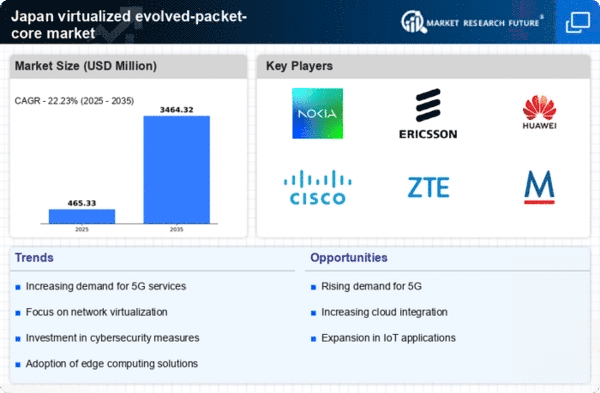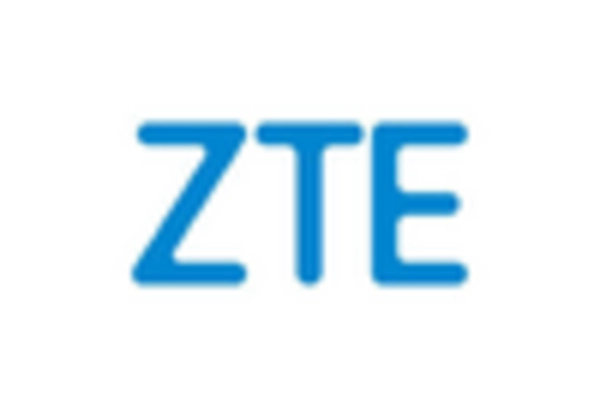Advancements in 5G Technology
The rollout of 5G technology in Japan is a major catalyst for the virtualized evolved-packet-core market. With 5G expected to deliver data speeds up to 100 times faster than 4G, telecom operators are compelled to upgrade their core networks to support this new standard. The virtualized evolved-packet-core market is poised to benefit from this transition, as virtualization allows for more agile and efficient network management. By 2025, it is anticipated that 5G will account for over 50% of mobile subscriptions in Japan, further driving demand for advanced core network solutions. This shift not only enhances connectivity but also opens avenues for innovative applications, thereby propelling market growth.
Rising Mobile Data Consumption
The surge in mobile data consumption in Japan is a pivotal driver for the virtualized evolved-packet-core market. With the increasing adoption of smartphones and IoT devices, mobile data traffic is projected to grow at an annual rate of approximately 30% through 2025. This trend necessitates robust and scalable network solutions, prompting telecom operators to invest in virtualized evolved-packet-core technologies. The ability to efficiently manage and route vast amounts of data traffic is crucial for maintaining service quality. As a result, the virtualized evolved-packet-core market is likely to experience significant growth, driven by the need for enhanced data handling capabilities and improved user experiences.
Shift Towards Cloud-Based Solutions
The shift towards cloud-based solutions is reshaping the landscape of the virtualized evolved-packet-core market. Japanese enterprises are increasingly adopting cloud technologies to enhance operational efficiency and reduce costs. This trend is driving telecom operators to explore virtualized evolved-packet-core solutions that can seamlessly integrate with cloud environments. By leveraging cloud capabilities, operators can achieve greater scalability and flexibility in their network operations. The market is likely to witness a surge in demand for solutions that facilitate cloud integration, as businesses seek to optimize their network performance and support the growing need for remote connectivity.
Growing Emphasis on Network Security
As cyber threats become increasingly sophisticated, the emphasis on network security is a critical driver for the virtualized evolved-packet-core market. Japanese telecom operators are prioritizing the implementation of secure network architectures to protect sensitive data and maintain customer trust. Virtualized evolved-packet-core solutions offer enhanced security features, such as dynamic threat detection and response capabilities. This focus on security is likely to lead to increased investments in virtualization technologies, as operators aim to safeguard their networks against potential breaches. The market is expected to expand as organizations recognize the importance of integrating robust security measures into their core network infrastructures.
Government Initiatives for Digital Transformation
The Japanese government is actively promoting digital transformation initiatives, which significantly impact the virtualized evolved-packet-core market. Policies aimed at enhancing digital infrastructure and connectivity are being implemented, with a focus on fostering innovation and economic growth. For instance, the government has allocated substantial funding to support the development of next-generation networks. This commitment is expected to stimulate investments in virtualized evolved-packet-core technologies, as operators seek to align with national objectives. The market is likely to see increased collaboration between public and private sectors, facilitating the adoption of advanced network solutions that can support Japan's digital economy.
















